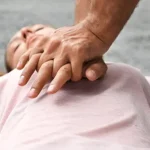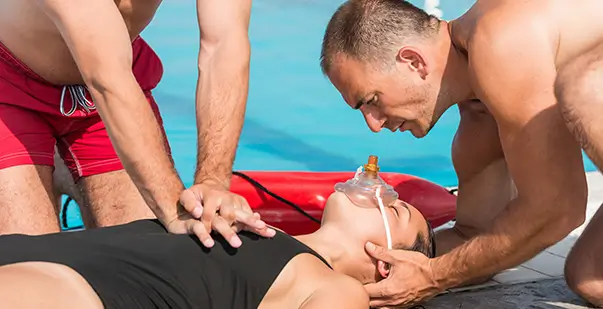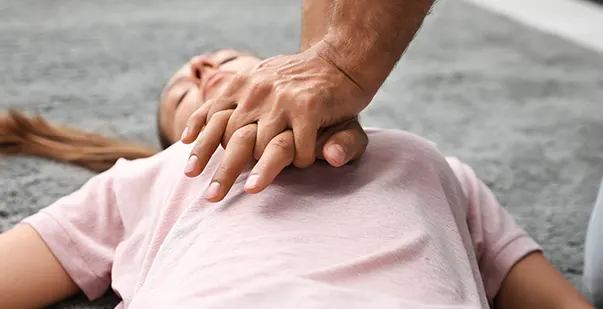When it comes to ensuring safety at the beach, lifeguards and beach patrol officers play a vital role. These dedicated individuals are responsible for:
- Protecting swimmers
- Responding to emergencies
- Providing essential first aid
One crucial skill that every lifeguard and beach patrol officer should have is Basic Life Support (BLS) certification.
CPR BLS certification online offered by American HealthCare Academy equips lifeguards and beach patrol officers with the knowledge and techniques to respond in life-threatening situations. In this article, your key takeaways will be:
- Why BLS certification is a must-have for lifeguards and beach patrol officers
- How it empowers them to save lives and maintain a safe beach environment
Enroll with us today and be better than the rest!
Understanding the Basic Principles of BLS and How They Can Be Applied in Water Rescue Situations
When it comes to water rescue situations, having a solid grasp of BLS principles is essential. Especially for lifeguards and beach patrol officers. Let’s explore some of the basic principles of BLS and how they can be applied in water rescue scenarios.
- Early Recognition and Activation
Lifeguards and beach patrol officers must stay vigilant. They have to continuously scan the water and surrounding areas for signs of distress. BLS certification online courses will provide them the ability to identify potential drowning victims.
- Airway Management
In water rescue situations, it is essential to clear the airway of any obstructions. For example, removing water or foreign objects, to help breathing. Proper head-tilt and chin-lift techniques can be used to open the airway. Also ensuring that draining of water happens before it’s too late.
- Rescue Breaths
Lifeguards and beach patrol officers are trained to deliver rescue breaths. It can be either through mouth-to-mouth or mouth-to-mask techniques. This helps restore oxygenation to the victim’s body, maintaining vital organ function.
- Chest Compressions
Lifeguards and beach patrol officers must apply compressions at the center of the victim’s chest. They have to maintain a consistent rhythm and depth. It circulates blood to vital organs. It buys valuable time until advanced medical assistance arrives.
- Defibrillation
Lifeguards and beach patrol officers should be trained in the use of automated external defibrillator (AED). Timely defibrillation combined with CPR significantly improves the chances of survival.
BLS principles can be applied in water rescue situations to help save lives. Here’s how:
Identifying signs of an emergency and acting pronto when someone is:
- Struggling
- Waving for help
- Unable to keep their head above the water
- If you gauge that you will need more helping hands, then alert other lifeguards and beach patrol officers nearby. Don’t put yourself in danger or attempt a rescue beyond your abilities without help.
- In some cases, the victim is conscious but struggling to stay afloat. Here you can try to support them by holding their hand or supporting their back while keeping yourself afloat. It’s important to maintain your safety as well.
Life-Saving-Tools-BLS-Education-for-Police-Officers-Can-Make-a-Difference-1Download
Benefits of BLS Certification for Lifeguards and Beach Patrol Officers
Here are the benefits of BLS certification for lifeguards and beach patrol officers:
- BLS certification equips lifeguards and beach patrol officers with the knowledge and skills to act swiftly in a drowning emergency.
- With proper training, lifeguards and beach patrol officers gain confidence in their ability to handle critical situations. They can confidently provide life-saving care to those in need.
- BLS certification ensures that lifeguards and beach patrol officers are trained in the most up-to-date life-saving techniques.
- With the BLS certification lifeguards and beach patrol officers can activate the appropriate response system promptly. This allows a rapid response for saving lives.
- BLS training teaches lifeguards and beach patrol officers the correct techniques for performing CPR and using AED. It also includes rescue breaths and chest compressions.
- BLS certification promotes effective teamwork and communication. It ensures a coordinated response and maximizes the efficiency of rescue efforts.
- BLS certification demonstrates the commitment to public safety. It can enhance career opportunities within the field.
BLS and High Quality CPR Certification
Basic Life Support or BLS class online is for everyone who wants to excel in their lifesaving skills. It includes high-quality CPR certification and first aid training as a part of the core course materials provided to the students.
Those interested in taking the course must know that the CPR and BLS certification courses offer completion cards after the final quiz. On successful completion of the quiz, you will earn the certification card and CE credit hours. Lifeguards, beach patrol officers, and others use these credit hours to get employed at better positions in their respective fields.
BLS recertification is also easy to achieve for such lifesavers 2 years after the date posted on the certificate. Renewal of BLS certification is helpful is lifeguards and patrol officers want to continue their profession to save lives no matter what.
Conclusion
Take the online CPR BLS for healthcare professionals combo course from American HealthCare Academy for understanding the basic principles of BLS. Lifeguards and beach patrol officers can make a significant impact on saving lives. BLS certification empowers these professionals with the knowledge and skills needed to respond during emergencies. It ensures the safety and well-being of beachgoers.













